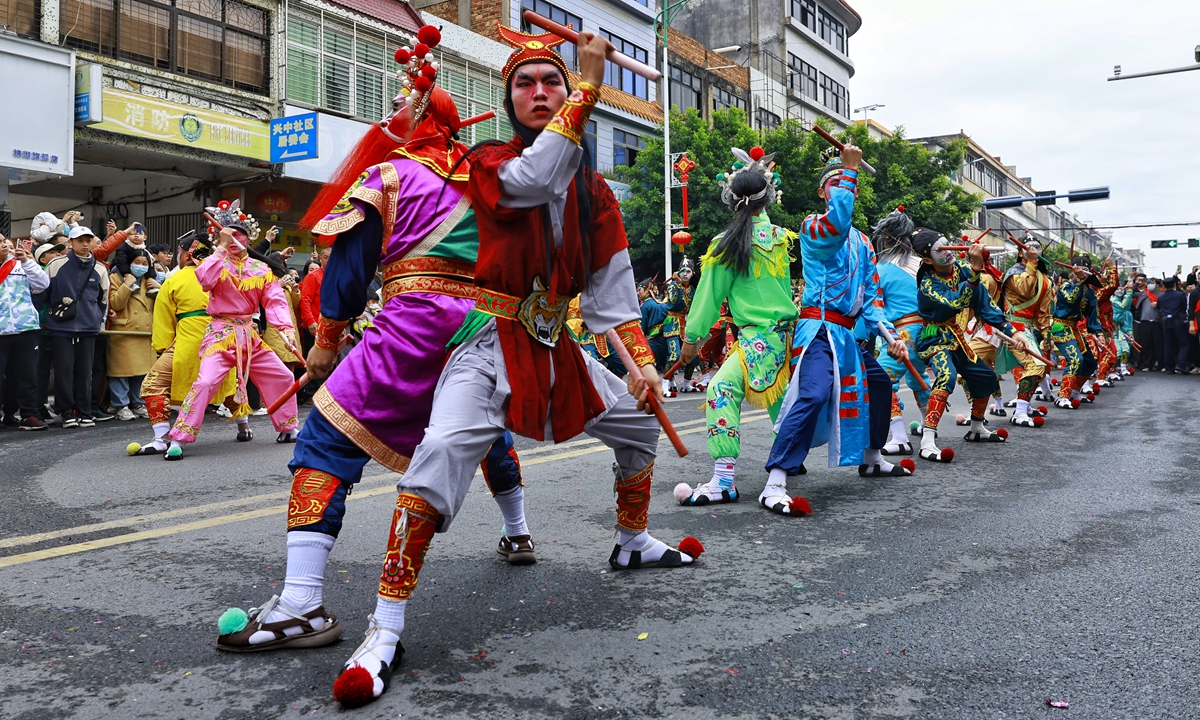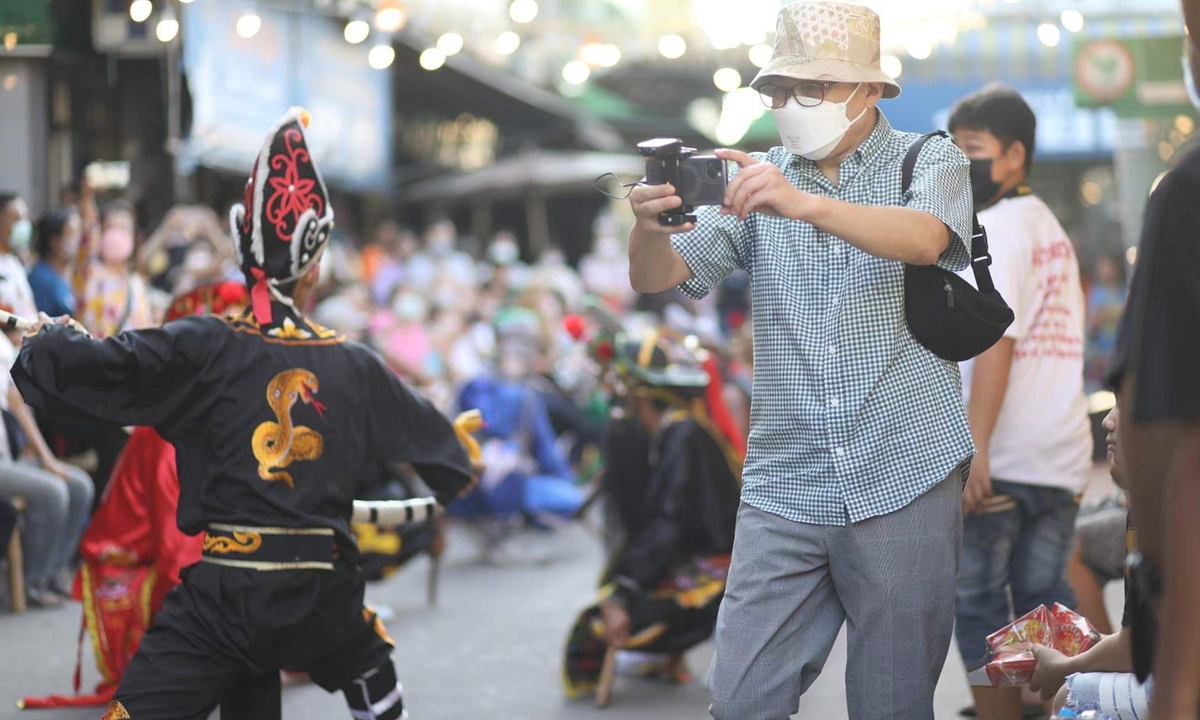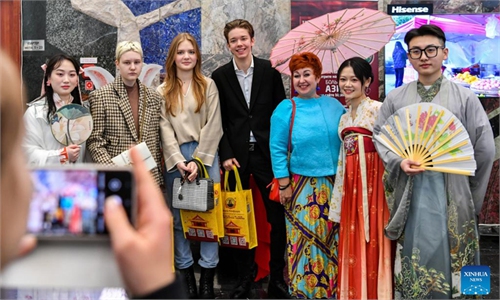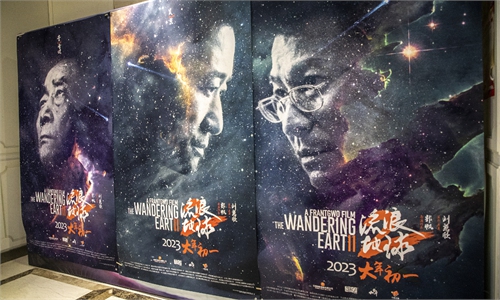ARTS / CULTURE & LEISURE
Potential joint China-Thailand UNESCO application demonstrates ancient Maritime Silk Road connection
Song of heroes

Yingge dance, a folk dance originating from the Chaoshan region of Guangdong 300 years ago, has now gained vitality in modern times thanks to social media. This has been especially true for Chen's troupe of 108 dancers, whose orderly dance formations have attracted visitors to Chaoshan after gaining millions of views and likes on the internet.
The dance form evolved from the religious Nuo Opera of southern China and is now usually performed in face makeup to present a single story: The adventures of the legendary "108 Heroes" of Liangshan Mountain from the classic novel Outlaws of the Marsh.
"Many people from other provinces told me that they drove thousands of kilometers just to see us dance. Thanks to the rising popularity of yingge in recent years, our troupe's commercial performances have been booked solid through to next month," the 27-year-old dancer told the Global Times.
This national intangible cultural heritage has also gained the attention of culture experts: The art originated in southern China, yet spread and also took root in neighboring countries such as Thailand.
Inheritors put forth a call for a joint application for UNESCO Intangible Cultural Heritage status for this art form, setting to bring about another transnational cultural bond under the 21st Century Maritime Silk Road.
"I saw how the two countries have cared for and carried forward this cultural heritage. The premise of applying for intangible cultural heritage is a subject's value to all mankind, and the development and innovation of this art in Thailand meets this criterion," Deng Yao, a legal expert on the Guangdong Intangible Cultural Heritage Protection Expert Committee, told the Global Times.

On Friday, a creative culture and art festival in Thailand's Phanat Nikhom district in eastern Thailand saw crowds moving to the beat of loud drums as an yingge dance troupe composed of over 40 performers showed off their talents at a shopping mall to celebrate the Chinese New Year.
The troupe includes locals, Thailand-born Chinese nationals, as well as a coach named Zou Dilü, the grandson of the pioneer who first brought yingge to Thailand over 100 years ago.
Zou's family has been an inheritor of the traditional dance in Thailand ever since.
During a trip to Thailand in 2022, Deng was impressed by the efforts of the people there to pass on yingge dance. He noted that at least one school in the district had been teaching yingge classes since 1998, and in another city in Thailand, some yingge troupes had been formed at a temple.
"They even filmed a movie called Yingge and played it on the first day of Chinese New Year as part of Spring Festival celebrations," Deng recalled.
"I can feel that overseas people and Chinese nationals have really put in tremendous effort in the development of Chinese culture," Deng told the Global Times.
A plausible plan
In China, the emphasis on yingge dance is not a recent move. It has long been considered by all walks of life as a symbol of Chinese culture which is well and integrally protected.
As early as 2006, China listed it as a National Intangible Cultural Heritage in order to better preserve and pass on the tradition.
"As a traditional folk dance widely circulated in the Chaoshan area, yingge has a broad social base," Chen Danping, director of the Intangible Cultural Heritage Protection Center in Puning, the birthplace of yingge in Guangdong, told the Global Times on Tuesday.
"It is one of the representatives of Cantonese culture: The performance has a core of promoting righteousness, auspiciousness and peace while suppressing evil energies," Chen said.
"Every year universities will organize yingge competitions, and we also introduced yingge textbooks to schools," noted Chen.
Deng said he has been working on pushing through a joint China-Thailand application to UNESCO, adding that "maybe other countries can jointly apply for the UNESCO list."
"It is something I am working on. And why not? After Chaoshan, yingge dance flourished and established roots in Thailand. Additionally, as some parts of yingge have disappeared in China, we found that the missing part was well preserved in Thailand. And this combination can better show the dance's integrity," said Deng.
Joint transnational UNESCO heritage applications are no longer a new adventure. A document from the China Academy of Cultural Heritage in 2022 shows that global interest in applying for transnational heritage is increasing, and the number of applications will continue to increase.
In December 2022, UNESCO inscribed the Wangchuan Ceremony Rituals and Related Practices to the Representative List of the Intangible Cultural Heritage of Humanity after a joint application from China and Malaysia. The move demonstrates the strong cultural ties between the two countries.
"UNESCO encourages and advocates two or more countries to apply for world heritage status, because it better reflects the authenticity and integrity of a heritage, and in such way it can effectively maintain the value of the heritage through coordination and cooperation," noted Li Junrong, a culture expert from Sanming University in East China's Fujian Province.

Dancers give a traditional yingge folk dance performance in Jiexi county, South China's Guangdong Province, in celebration of the Chinese New Year on January 31, 2023. Photo: Li Hao/Global Times
Throughout the crowded Spring Festival holidays, dancer Chen Xiangyu and his team have been rushing around non-stop throughout South China's Guangdong Province to present the centuries-old dance known as yingge, which roughly translates to "Song of Heroes," to audiences.Yingge dance, a folk dance originating from the Chaoshan region of Guangdong 300 years ago, has now gained vitality in modern times thanks to social media. This has been especially true for Chen's troupe of 108 dancers, whose orderly dance formations have attracted visitors to Chaoshan after gaining millions of views and likes on the internet.
The dance form evolved from the religious Nuo Opera of southern China and is now usually performed in face makeup to present a single story: The adventures of the legendary "108 Heroes" of Liangshan Mountain from the classic novel Outlaws of the Marsh.
"Many people from other provinces told me that they drove thousands of kilometers just to see us dance. Thanks to the rising popularity of yingge in recent years, our troupe's commercial performances have been booked solid through to next month," the 27-year-old dancer told the Global Times.
This national intangible cultural heritage has also gained the attention of culture experts: The art originated in southern China, yet spread and also took root in neighboring countries such as Thailand.
Inheritors put forth a call for a joint application for UNESCO Intangible Cultural Heritage status for this art form, setting to bring about another transnational cultural bond under the 21st Century Maritime Silk Road.
"I saw how the two countries have cared for and carried forward this cultural heritage. The premise of applying for intangible cultural heritage is a subject's value to all mankind, and the development and innovation of this art in Thailand meets this criterion," Deng Yao, a legal expert on the Guangdong Intangible Cultural Heritage Protection Expert Committee, told the Global Times.

Deng Yao takes photos of a yingge dancer in Phanat Nikhom, Thailand on December 10, 2022. Photo: Courtesy of Deng Yao
Taking rootOn Friday, a creative culture and art festival in Thailand's Phanat Nikhom district in eastern Thailand saw crowds moving to the beat of loud drums as an yingge dance troupe composed of over 40 performers showed off their talents at a shopping mall to celebrate the Chinese New Year.
The troupe includes locals, Thailand-born Chinese nationals, as well as a coach named Zou Dilü, the grandson of the pioneer who first brought yingge to Thailand over 100 years ago.
Zou's family has been an inheritor of the traditional dance in Thailand ever since.
During a trip to Thailand in 2022, Deng was impressed by the efforts of the people there to pass on yingge dance. He noted that at least one school in the district had been teaching yingge classes since 1998, and in another city in Thailand, some yingge troupes had been formed at a temple.
"They even filmed a movie called Yingge and played it on the first day of Chinese New Year as part of Spring Festival celebrations," Deng recalled.
"I can feel that overseas people and Chinese nationals have really put in tremendous effort in the development of Chinese culture," Deng told the Global Times.
A plausible plan
In China, the emphasis on yingge dance is not a recent move. It has long been considered by all walks of life as a symbol of Chinese culture which is well and integrally protected.
As early as 2006, China listed it as a National Intangible Cultural Heritage in order to better preserve and pass on the tradition.
"As a traditional folk dance widely circulated in the Chaoshan area, yingge has a broad social base," Chen Danping, director of the Intangible Cultural Heritage Protection Center in Puning, the birthplace of yingge in Guangdong, told the Global Times on Tuesday.
"It is one of the representatives of Cantonese culture: The performance has a core of promoting righteousness, auspiciousness and peace while suppressing evil energies," Chen said.
"Every year universities will organize yingge competitions, and we also introduced yingge textbooks to schools," noted Chen.
Deng said he has been working on pushing through a joint China-Thailand application to UNESCO, adding that "maybe other countries can jointly apply for the UNESCO list."
"It is something I am working on. And why not? After Chaoshan, yingge dance flourished and established roots in Thailand. Additionally, as some parts of yingge have disappeared in China, we found that the missing part was well preserved in Thailand. And this combination can better show the dance's integrity," said Deng.
Joint transnational UNESCO heritage applications are no longer a new adventure. A document from the China Academy of Cultural Heritage in 2022 shows that global interest in applying for transnational heritage is increasing, and the number of applications will continue to increase.
In December 2022, UNESCO inscribed the Wangchuan Ceremony Rituals and Related Practices to the Representative List of the Intangible Cultural Heritage of Humanity after a joint application from China and Malaysia. The move demonstrates the strong cultural ties between the two countries.
"UNESCO encourages and advocates two or more countries to apply for world heritage status, because it better reflects the authenticity and integrity of a heritage, and in such way it can effectively maintain the value of the heritage through coordination and cooperation," noted Li Junrong, a culture expert from Sanming University in East China's Fujian Province.



